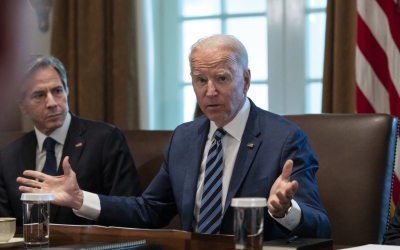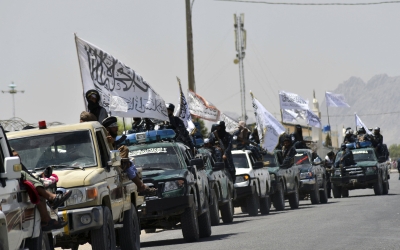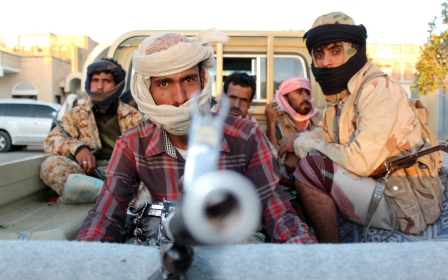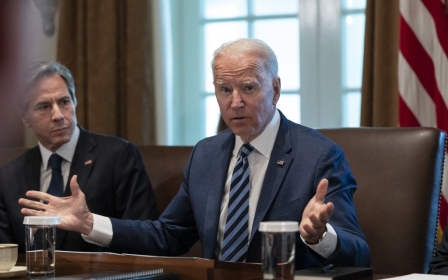Houthi attacks cast spotlight on US commitment to Riyadh's security
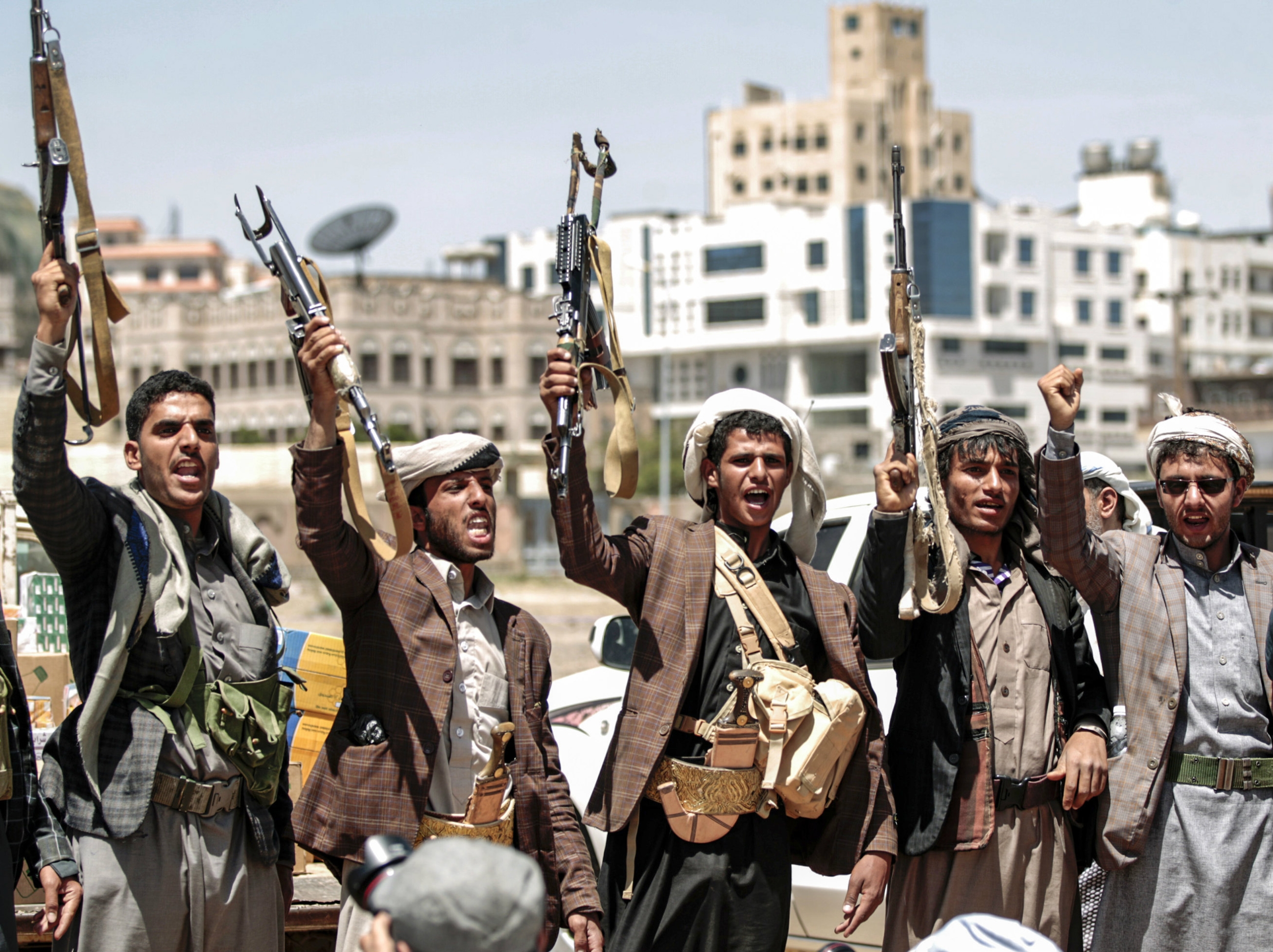
The United States' relationship with Saudi Arabia appears to be "levelling" after coming under strain during the early months of the Biden administration due to the war in Yemen and concerns over human rights, experts have said.
The White House has been making a concerted push to reassure its regional allies of its commitment to the Middle East, with Secretary of State Antony Blinken and Lloyd Austin, the head of the US Department of Defense, recently concluding a "thank you tour" for allies and troops who helped in the massive US-led airlift from Afghanistan after the Taliban takeover.
The Taliban seized control of the Afghan capital, Kabul, on 15 August after the US and its allies withdrew their troops after nearly two decades of conflict.
Saudi Arabia's erstwhile rival Qatar played an outsized role in the withdrawal, helping evacuate thousands of Afghans and US citizens.
While Riyadh has limited its response to the Taliban takeover, a recent series of attacks on Saudi Arabia by Houthi rebels inside Yemen has put a focus on the United States' commitment to its Gulf allies' regional security.
Last week, a Houthi drone attack injured eight people at Abha airport, and, on Saturday, two people were wounded when Saudi authorities intercepted a ballistic missile fired at its oil-rich eastern region.
Since assuming office, US President Joe Biden has pushed to end the Yemen conflict, with his administration announcing plans to end offensive support for the Saudi-led military campaign fighting Houthi rebels.
Biden also announced that his administration was reviewing arms sales to Riyadh, and the White House would deal directly with the 85-year-old King Salman, not the country's de-facto ruler, Crown Prince Mohammad bin Salman, also known by his initials MBS.
A Western official in the region told Middle East Eye that the Saudis felt snubbed during the initial months of the Biden administration and by its rhetoric, but that there was now a "levelling" of the relationship.
"For a time there was this incessant nature of hitting the Saudis," the source said. "They [the Saudis] have a lot of pride."
A subtle shift
Saudi Arabia and a coalition of Arab states intervened in Yemen's war in March 2015 after Houthi rebels ousted the internationally recognised government of President Abd-Rabbuh Mansour Hadi.
Backed by Washington, the coalition has launched more than 20,000 air raids in an attempt to dislodge the rebels from power.
For the past few years, the war has largely been in a military stalemate, with the Houthis controlling most urban centres in the north, while UAE-aligned militias regulate territory in the south.
While many Democrats have applauded the Biden administration's decision to end support for the war effort, others on Capitol Hill have raised concerns that it has emboldened the Houthis to continue their offensive.
"The manner in which the US ended offensive support and lifted the FTO designation was problematic," a Senate aide told MEE on condition of anonymity.
"It sent a message to the Houthis that they have a green light to escalate against Saudi Arabia with no repercussions.”
But some analysts say US policy changes in Yemen are much more nuanced than the administration or its critics might make it seem.
"There has been a modest change at best, and that has been rhetorical versus policy," Trevor Johnston, an analyst with Rand Corporation, told MEE.
One of the more apparent signs of US involvement in the Yemen war was ended by the Trump administration when it announced in 2018 that it would halt the practice of refuelling Saudi coalition aircraft.
"Where we have seen a shift is on the diplomatic end," Johnston said.
'Leverage is minimal at best'
In February, the Biden administration appointed Tim Lenderking as special US envoy to Yemen, and the US has been trying to promote a UN peace plan as a resolution to the conflict. But these efforts have stalled and renewed fighting around the city of Marib has cast doubt on any immediate prospects for peace.
"We are not sure there is much the US can do to actually end this conflict. Our leverage is minimal at best," the Senate aide told MEE.
As the Biden administration's push for peace has ebbed, it also appears to be re-examining its initial stance on its longtime Gulf ally. Washington has partially shifted its tone on military support by approving arms sales to the kingdom, including the sale of Thaad ballistic missiles and Black Hawk helicopters.
"The clear-thinking Saudis knew there needed to be a recalibration," the Western official said, regarding Washington's relationship with Riyadh under Biden versus Trump. "I think now you are seeing a levelling, and a bit more understanding on both sides."
Following the recent Houthi missile and drone attacks, Blinken held a call with Saudi Arabia's foreign minister which focused on strengthening the bilateral relationship.
"The secretary expressed the US' strong commitment to its longstanding strategic partnership with the kingdom and to helping Saudi Arabia defend its people and territory," the State Department said following the call.
But the rhetorical support will likely do little to stem the cross- border attacks which are part of a wider military campaign in Yemen being fought by Saudi Arabia and its allies on the one hand and Houthi forces backed by Iran on the other.
And while Houthi attacks garner a lot of public attention, sources say even Saudi Arabia is coming to terms with the attacks. The country's defence systems, with US support, have also become adept at stopping most of the missiles.
"There doesn't seem to be a great deal more the Saudis can do for the time being, beyond intercepting attacks and trying to locate launch sites," Peter Salisbury, a senior analyst with International Crisis Group, told MEE. "Until now, they have been relatively successful in this."
The Western official echoed Salisbury's remarks, saying Riyadh was accepting the new reality of intermittent Houthi attacks.
"They won't say it publicly, but it's a matter of percentages, one or two get through," the official said. "They are outraged as a matter of national sovereignty, but for now it's an irritant."
Middle East Eye delivers independent and unrivalled coverage and analysis of the Middle East, North Africa and beyond. To learn more about republishing this content and the associated fees, please fill out this form. More about MEE can be found here.



